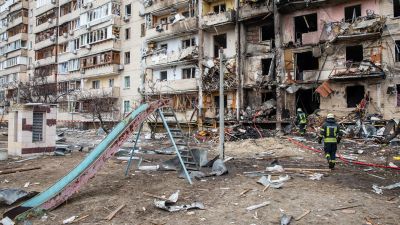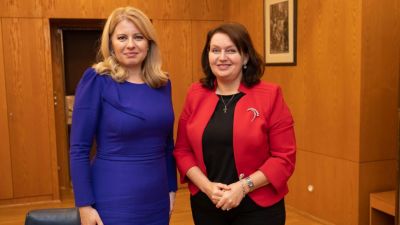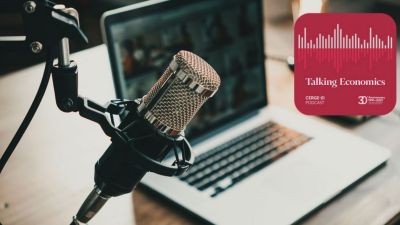This Friday marks one year since Russia launched the brutal invasion of its sovereign neighbour, Ukraine. The war, referred to euphemistically as a special military operation by Russian leader Vladimir Putin, has ground on, claiming countless civilian and military casualties. The start of the attack, February 24, 2022 became a date synonymous with other days of infamy when “everything changed”.

The dean of the Faculty of Social Sciences, Tomáš Karásek, speaking ar a special conference organised at Charles University on Ukraine..
The invasion, which many observers until the last minute hoped was only bluster or bluff, was a blatant upending of the rules-based international order laid out after WWII, a shock to the system, which individual nations have been coming to terms with since. Charles University, from the first hours of the invasion, was active in looking to help. In the weeks ahead it focused on many refugees, students and family members, who had fled to Czechia.
On the eve of the anniversary, the Faculty of Social Sciences held a conference at the school’s Blue Auditorium to discuss the systemic shock and responses now and into the future. Like other faculties and various bodies at Charles University, it had become involved from the get-go after the war in Ukraine began.
 This consisted not only in direct support of Ukrainians, but also in publishing the expertise of scientists and scholars bringing further insight to the unprecedented developments. Then, last May, the Faculty of Social Sciences followed up its activities by forming an interdisciplinary Expert Group for Ukraine, composed of faculty academics whose expertise ranged from international relations, security studies and sociology, to public and social policy, economics, and media studies. One of the members, Professor Emil Aslan, had spoken to Forum a week into the conflct when Ukraine had stunned the world by successfully resisting the Russian onslaught. Many of the observations in that interview are as accurate a year later as they were then.
This consisted not only in direct support of Ukrainians, but also in publishing the expertise of scientists and scholars bringing further insight to the unprecedented developments. Then, last May, the Faculty of Social Sciences followed up its activities by forming an interdisciplinary Expert Group for Ukraine, composed of faculty academics whose expertise ranged from international relations, security studies and sociology, to public and social policy, economics, and media studies. One of the members, Professor Emil Aslan, had spoken to Forum a week into the conflct when Ukraine had stunned the world by successfully resisting the Russian onslaught. Many of the observations in that interview are as accurate a year later as they were then.
Speaking at the conference at Charles University this week, Faculty of Social Sciences Dean Tomaš Karásek explained it was important now to shift from the present to outlining steps for the future; that was echoed by the panel discussions that followed. “The first part covers the international security situation and what the Czech Republic can or should do as an actor. The second, is the impact of the war in Ukraine on the situation in the Czech Republic and Ukrainians coming here. We should look at the functioning of the Czech labour market and how to help Ukrainian refugees and also outline the strategic goals we want to pursue.”
Rector thanks academic community
The rector of Charles University, Milena Králíčková, also attended on Tuesday, greeting participants and thanking the faculty for its contribution and efforts. “We as a university tried to react very quickly last February. Many of you will know that we welcomed hundreds of freemovers to the university - that is, students who wanted to continue their studies where they had to interrupt them in Ukraine. We have been able to engage in supporting [Ukrainian] academics who have found a home and employment in our faculties. I would like to say a big thank you to all the students and academics who helped their colleagues, and in general to all the faculties who did not hesitate to offer employment and a helping hand,” she said.

Milena Králíčková had been rector of Charles University for a little over three weeks when Putin launched Russia's war against Ukraine.
Efforts by the Faculty of Social Sciences have not been lost on others including the Ministry of Foreign Affairs headed by Minister Jan Lipavský, who himself received his degree from the faculty some years back. He had been expected to attend on Tuesday but in the end had to decline for health reasons. Deputy foreign minster and fellow faculty graduate Jiří Kozák attended in his stead, focusing on the dedication the Czech Republic, through its people, government and NGOs, had shown to Ukraine since the conflict began.
If it wanted, Russia could end the war at once
The deputy minister, in turn, strongly rejected the claim by some critics that arming Ukraine was “prolonging the war unnecessarily”. “Russia was the one who invaded a sovereign neighbour, challenging its statehood and right to exist and claiming part of its territory as its own. The fighting is being fought on Ukrainian territory, and the moment Russia stops military operations and withdraws from Ukraine, the war will end, and the time for negotiations will begin. Russia started the war, Russia can end it in an instant. Ukraine can hardly be blamed for defending itself. It is up to Ukraine to decide when and what it wants to negotiate with the aggressor. Our task is to help the victims of aggression,” said Deputy Minister Kozák. His statement about the end of the conflict being up to Russia, is reminiscent of US Secretary of State Antony Blinken’s words to the U. N. Security Council last year: “If Russia stops fighting this war today, the war ends”. The second part of Blinken's statment, as many will remember, continued “If Ukraine stops fighting, Ukraine ends.”

Deputy Foreign MinisterJiří Kozák made clear there is one aggressor in the Ukraine war and it is not Ukraine..
Jiří Kozák also reminded attendees the country was facing a long-term systemic conflict with Russia and that it could not be assumed that the behaviour of the regime there, no matter who was in charge, will fundamentally change towards the West. “In terms of our country's security, we must minimise Russia's influence and we must strengthen our resilience in all areas. We need to achieve strategic independence from Russia as soon as possible, which of course is especially true in the supply of mineral resources. We should also work with the relatively large Russian minority living in the Czech Republic, especially with people belonging to the democratic opposition or with independent journalists. Of course, we must not forget to support representatives of Russian civil society and human rights defenders who have remained in Russia. Given our historical experience, we feel it is our duty to actively participate in the debates on the future relations of the European Union and NATO with Russia, or to try to determine their direction,” he said.
His address was followed by an expert discussion with two different panels, with the first looking at Czech foreign policy. Speakers included Jitka Látal Znamenáčková, the Permanent Representative of the Czech Republic to the Political and Security Committee of the European Union, and Jan Marian, Special Representative for Eastern Partnership issues, together with representatives from the Faculty of Social Sciences of Charles University, Professor Ivo Šlosarčík and Michal Parízek. The discussion was moderated by Tomáš Weiss from the Institute of International Studies at the faculty.

First panel: From left, Ivo Šlosarčík, Jitka Látal Znamenáčková, Jan Marian and Michal Parízek. Moderated by Tomáš Weiss (centre).
This part of the discussion focused on the issue of EU enlargement and the desire of Ukrainian leaders, led by President Volodymyr Zelenskyy, to receive an invitation to the European Community. As Jitka Látal Znamenáčková noted, although this is a priority for Ukraine at this time, the member states see more importance in smoothly and gradually preparing Ukraine for accession to the union, for example at the level of market integration, rather than in setting a date for the start of accession talks.

Ondřej Klípa and Tomáš Prouza (right) were among those on the second panel.
The second panel discussion was titled Ukrainians in the Czech Republic: between humanitarian aid and labour market regulation. It focused mainly on the issue of war refugees from Ukraine. Panelists were Andrea Krchová, director of the Consortium of NGOs Working with Migrants, and Tomáš Prouza, president of the Confederation of Commerce and Tourism of the Czech Republic, participated, while Tereza Freidingerová and Ondřej Klípa represented the faculty of Social Sciences. The moderator was Marie Jelínková from the Institute of Sociological Studies at the faculty.
The panellists recalled that since the beginning of the war about 480,000 refugees from Ukraine have arrived in the Czech Republic and about 350,000 have stayed here. Ondřej Klípa pointed out that the composition of those arriving from Ukraine changed with the war. While before the conflict it was more men with lower education who came to the Czech Republic seeking employment in unskilled jobs, following February it was more educated women with children who came to the Czech Republic. Tomáš Prouza recalled that before the war, Ukraine was perceived as a source country from which cheap labour came to the Czech Republic. However, he predicted that after the war this would change as a great number of investment opportunities would arise in helping rebuild the war-torn country.
Post-war reconstruction is also linked to the question of whether refugees will be eager to return and help, or whether they will prefer to settle permanently in the places where they took refuge when the conflict started. At present, even the panellists who have long been involved in the issue of transnational migration could not predict how this question might develop in the future.
A significant development now
Meanwhile, an important development at CU came when a new research centre called Ukraine in a Changing Europe was unveiled by the Institute of International Studies at the Faculty of Social Studies this week. The centre will aim to explain the root causes of Russia's ongoing war of aggression and the structural differences between Ukrainian and Russian societies. It will place regional developments in a broader context in order to assess the implications of the Russian war and Ukrainian resistance for the future of the European Union. The Centre will be led by Valeria Korablyova, Assistant Professor in the Department of Russian and East European Studies at the Faculty of Arts of Charles University.





















